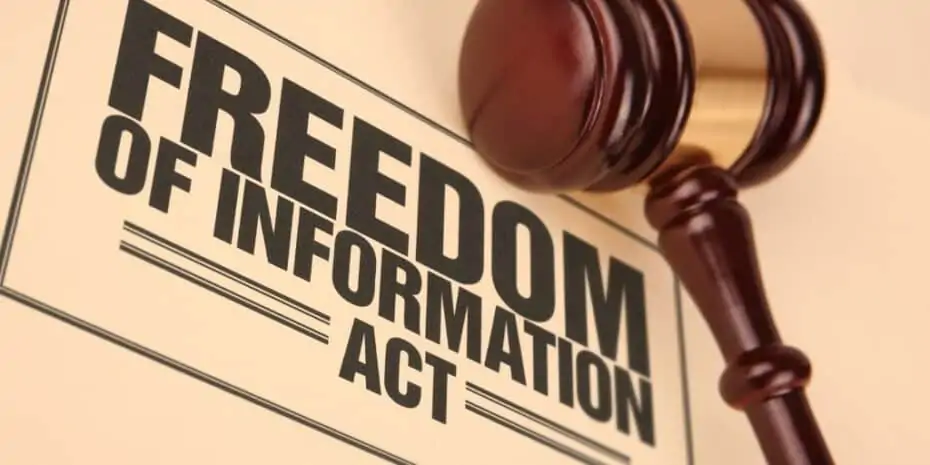What Is the Freedom of Information Act (FOIA)?
REtipster does not provide legal advice. The information in this article can be impacted by many unique variables. Always consult with a qualified legal professional before taking action.
How Does the Freedom of Information Act Work?
Under the Freedom of Information Act[1], any “person” is authorized to access, inspect, or receive copies of public records managed by a public body. This includes print documents, email, photographs, videos, and electronic records. Note that the “person” refers to any individual (citizens and foreign nationals), corporation, partnership, firm, organization, or other legal entity, as long as they are not serving a prison sentence.
Under the Freedom of Information Act, government organizations must agree to disclose requested information if it is not protected from public disclosure.
The Freedom of Information Act applies only to federal agencies and not federal courts and congress. Furthermore, it does not apply to state government agency records, although some state laws may provide similar rights.
There are several reasons the Freedom of Information Act may be invoked, such as for those who seek information about themselves or their relatives. On the other hand, news organizations use it to help keep the government accountable. Authorized public records are also helpful for business purposes, which is why many private companies, including real estate investors, use them to source information on certain investments and properties.
As it provides transparency to the public, the Freedom of Information Act is considered a sunshine law. The term “sunshine law” can be traced back to the Government in the Sunshine Law of Florida[2], enacted to stipulate transparency of all meetings within any local county or municipal board. As such, sunshine laws ensure specific government activities and operations provide disclosure and transparency.
Types of Records That Can Be Obtained
Through the Freedom of Information Act, any existing record kept by the federal government is subject to disclosure when requested by an authorized individual or party. It covers records that have already been prepared and used prior to the request.
These can include:
- Policy information
- Local and municipality orders
- Government rules
- Reports and studies
- Public contracts and other similar information
The term “records” may refer to the following:
- Documents
- Papers and reports
- Letters
- Electronic mail
- Films and documentaries
- Photographs
- Sound recordings
- Computer tapes
While the Freedom of Information Act allows access to pre-used or -possessed records, it does not permit an agency to analyze data, answer written inquiries, or create records or compilations of records in response to a request.
Additionally, the Freedom of Information Act establishes nine exemptions for types of information that are not permitted to be disclosed, as doing so can potentially be harmful to state and/or private interests. There are also three exclusions on law enforcement or national security that may prevent an individual from gaining access to a public record.
The Freedom of Information Act and Real Estate
Through the Freedom of Information Act, real estate investors and other related individuals gain access to documents and other data in possession of a government or public authority.
They can leverage this piece of legislation to obtain information on various aspects of real estate, including:
- Property records for permits.
- Data on foreclosure properties.
- Deeds and records related to the acquisition of a property.
- Leases.
- Easements.
Exemptions and Exclusions
A person requesting access to public records has to make sure that the documents do not fall into one of the nine FOIA exemptions. Otherwise, the request will not be granted.
Established in the Act and related regulations, these exemptions cover:
- Records classified to protect national security under Executive Order 12958[3].
- Records related to internal personnel rules and agency practices.
- Information protected by other federal law.
- Trade secrets and commercial or financial records that may put a company’s interest at risk.
- Privileged communications, such as:
- Deliberative process privilege
- Attorney work-product privilege
- Attorney-client privilege
- Information that instigates an unwarranted invasion of an individual’s privacy.
- Information compiled for law enforcement purposes that:
- Interferes with enforcement proceedings.
- Deprives an individual of a right to a fair trial.
- Deliberately invades personal privacy.
- Discloses the identity of a confidential source.
- Reveals techniques and procedures for law enforcement investigations and prosecutions.
- Endangers the life or physical safety of an individual.
- Information on the regulation or supervision of financial institutions.
- Records that protect geological and geophysical information on wells.
Exclusions
In the 1986 amendment of the Freedom of Information Act, Congress put together a mechanism to protect sensitive law enforcement information that resulted in three special protection provisions. Referred to as “exclusions,” they authorize federal law enforcement agencies—under this limited set of circumstances—to “treat the records as not subject to the requirements of the Freedom of Information Act[4].”
Exclusion No. 1
The first exclusion involves access to records described in the (7)(a) exemption above. It protects the existence of an ongoing criminal law enforcement investigation or proceeding when the subject is not aware of its pendency, and record disclosure could be expected to impede enforcement proceedings.
Exclusion No. 2
The second exclusion applies to a narrower circumstance limited to criminal law enforcement agencies. It protects the existence of informant records if the informant’s status has not been officially confirmed.
Exclusion No. 3
The third exclusion pertains only to particular law enforcement records held by the Federal Bureau of Investigation. It protects the existence of foreign intelligence or international terrorism records when such records are classified.
Reasons a Request May Be Denied
A government agency can deny a Freedom of Information Act request for several reasons, including:
- Non-existent documents. If the record does not exist or cannot be thoroughly identified, then the agency can deny a person’s request on that basis.
- Information that does not fall under “public records.” Governing bodies have a set of qualifications for records that can be shared with the public. When the record being requested falls under the exclusions and exemptions set by the government, the request can be denied.
- Need for document creation. Agencies are forbidden to create documents or records for the sake of fulfilling the request of a third party. If the request requires the public body to create a new document, the request will not be granted.
How to Submit a Freedom of Information Act Request
There is no specific format or template required to make a Freedom of Information Act request[5]. However, the request must strictly be in writing. Additionally, it must meet the following standards:
- It describes reasonably and in as much detail as possible the information or record being sought.
- It complies with the requirements of the agency that keeps the record.
- It states the format in which the requestor wants to receive the record.
As a rule, federal agencies must have a dedicated Freedom of Information Act page on their official websites, and they can accept requests submitted by mail, fax, or email. It is expected that requestors already know whether the information they are searching for is already available to the public or not.
They must also determine the right agency that holds the records and place the request with them accordingly. Requestors can do this by checking the details found on the official Freedom of Information Act website, which provides a good starting point for correctly submitting a request.
Note that the time it takes to respond to a request is not fixed; it varies depending on the complexity of the request and the backlog of requests pending at the specific agency.
Things to Include in the Request
As mentioned earlier, agencies appreciate it when requestors provide a clear and concise description of the record they are trying to find.
The following details help make the search process much more straightforward:
- Title, subject, and possible location of the information.
- Estimated date of record creation.
- Individuals, offices, or agencies involved.
- Case number, reference number, and information source or file designation, if available.
Takeaways
The Freedom of Information Act (FOIA) is federal legislation that allows individuals or organizations to access records from the federal government. Consequently, it requires any government or public body to provide information or records to people who request them. A Freedom of Information Act request can be approved when it meets the requirements set by the government, such as providing a clear and concise description of the record they are seeking, as well as knowing which particular agency holds that record. Nevertheless, a request can result in denial when the information is non-existent, not classified under “public records,” and/or requires creating a new document.
Under the Freedom of Information Act, any person or legal entity can submit a request to the agencies or offices that hold the record they need. While the Freedom of Information Act empowers citizens to demand transparency and hold the government accountable, it has its share of exemptions and exclusions to protect certain interests of both public and private entities.
Sources
- The Freedom Of Information Act, 5 U.S.C. § 552 (1967.) Retrieved from https://www.justice.gov/oip/freedom-information-act-5-usc-552
- Office of the Florida Attorney General. (n.d.) Open Government – The “Sunshine” Law. Retrieved from https://myfloridalegal.com/pages.nsf/Main/DC0B20B7DC22B7418525791B006A54E4
- United States Department of Justice. (1995.) FOIA Update: Executive Order 12,958–classified National Security Information. Retrieved from https://www.justice.gov/oip/blog/foia-update-executive-order-12958-classified-national-security-information
- United States Department of Justice. (n.d.) Implementing FOIA’s Statutory Exclusion Provisions. Retrieved from https://www.justice.gov/oip/blog/foia-guidance-6
- FOIA.gov. (n.d.) How do I make a FOIA Request? Retrieved from https://www.foia.gov/how-to.html







